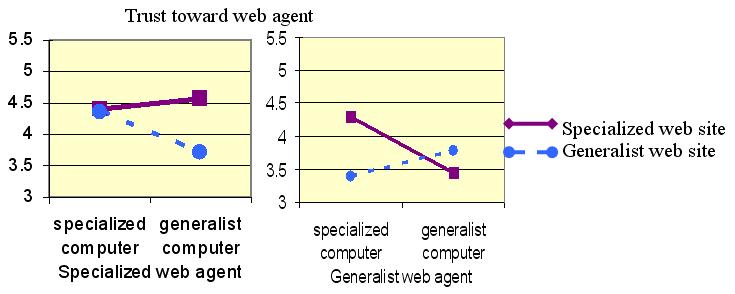Media Effects Research Lab - Research Archive
Effects of specialization of media technology at multiple source layers upon online trust:
Student Researcher(s)
Yoon Jeon Koh (Ph.D Candidate);
Faculty Supervisor
INTRODUCTION
Media specialization has provided psychological superiority (e.g., expertise) in certain content domains at the levels of a television channel as well as the TV set. Specialization becomes more importance since it has frequently been applied to media technology (e.g., computer, web site or web agent) in an online context, in which multiple media technologies are employed as sources. Thus, this dissertation attempted to (1) explore the effects of specialization of media technology at multiple source layers (e.g., computer, web site, and web agent) on attitudes (e.g., trust) in HCI and (2) investigate the mechanisms underlying the effects of specialized media technologies at multiple source layers on trust toward different trustees (e.g., media technology and product descriptions) and different dimensions of trust (e.g., cognitive and affective trust), with a focus on the role played by the nature of information processing (i.e., heuristic vs. systematic processing). Based on cognitive psychology, social psychology, and HCI literatures, with an emphasis on their relation to trust in e-commerce, two studies were conducted with an online shopping task for purchasing wines and online questionnaires.
STUDY 1
RESEARCH QUESTION/ HYPOTHESES:
H1: Individuals will show greater trust toward specialist media technology compared to generalist media technology.
H2: The level of specialization of media technology at multiple source layers will be interactively associated with the individual’s trust in the media technology.
RQ1: What is the relationship between the level of specialization of media technology at multiple source layers (e.g., computer, web site, web agent) and the degree of trust in the media technology?
METHOD
This study employed a 2 (computer: specialist computer vs. generalist computer) x 2 (web site: specialist web site vs. generalist web site) x 2 (web agent: specialist web agent vs. generalist web agent) between-subjects experimental design. During the online shopping task, each participant was instructed to place an order after purchasing eight bottles of wine. Trust in each media technology as dependent variable was measured in the online questionnaire, which was administered immediately after the online shopping task. The online questionnaire also included institutional and dispositional trust as covariates.
RESULTS
Results showed that participants attributed greater expertise to the media source in the specialist conditions compared to generalist conditions. Results indicated that individuals showed greater trust toward a specialist media technology (computer, web agent) than a generalist media technology. However, there was no significant difference in trust toward web site between specialist web site and generalist web site conditions. The specialization effect of web agent appears to translate over to greater trust in the web site. Moreover, interaction effects revealed that trust in each of the three sources was enhanced under the following conditions: when the source was specialized and at least one of the other two layers were specialized, or when the source was a generalist and both the other sources were specialists.
Figure 1. Three-Way Interaction Effects of the Specialization of Computer, Web Site, and Web Agent on Trust toward Computer
Figure 2. Three-Way Interaction Effect of the Specialization of Computer, Web Site, and Web Agent on Trust toward Web Site
Figure 3. Three-Way Interaction Effect of the Specialization of Computer, Web Site, and Web Agent on Trust toward Web Agent

CONCLUSIONS
The study conducted here extended media specialization to the context of HCI, broadened the media-equation literature in terms of mindless social responses toward specialized media technology and explored the interactive effects of media technology at multiple source layers on trust in e-commerce. However, this study did not offer an explanation regarding how specialization of media technology at multiple source layers in online communication may influence either heuristic or systematic information processing. Nor did the study explore the relationships between modes of information processing and attitude formations (e.g., trust in different trustees and different dimensions of trust). Thus, a follow-up experiment was designed to explore how specialization of media technology at multiple source layers influenced different modes of information processing depending on the level of specialization, finally leading to different associations with trust in different trustees and different dimensions of trust.
For more details regarding the study contact
Dr. S. Shyam Sundar by e-mail at sss12@psu.edu or by telephone at (814) 865-2173

